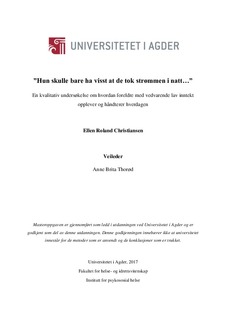”Hun skulle bare ha visst at de tok strømmen i natt…” : en kvalitativ undersøkelse om hvordan foreldre med vedvarende lav inntekt opplever og håndterer hverdagen
Master thesis
Permanent lenke
http://hdl.handle.net/11250/2455896Utgivelsesdato
2017Metadata
Vis full innførselSamlinger
Sammendrag
Background:
Personal economics, living conditions and social conditions often have a modest place in the mental health services. For people with mental health problems, economic challenges can be a major additional burden.
Aim and research question:
The purpose of the study has been to increase knowledge about how parents perceive and handle sustained low income.
The study has the following research question: "How do parents with sustained low income experience and deal with everyday life?" Method:
This is a qualitative survey based on data from in-depth interviews with four parents conducted in the autumn of 2016. The method is hermeneutically-phenomenological and the findings are analyzed using Malterud's modified edition of Giorgi's phenomenological analysis model.
Result: The results showed that the sustained low income significantly affected the parents' lives. The financial framework set clear limits for both parents and children, but the children's needs were here highly prioritized. The parents described different strategies to make ends meet, using cognitive, problem- and emotion-focused coping. The parents experienced the emotion-focused coping particularly demanding and challenging in the long run. Their prolonged weak personal economy resulted in lack of resources and opportunities to participate in social happenings for the whole family, which led to the experience of social exclusion. Parents talked about the perception of empowerment, impaired autonomy and stigmatization.
Keywords:
Poverty, mental health, coping, social exclusion, stigmatization.
Beskrivelse
Masteroppgave psykisk helsearbeid ME504 - Universitetet i Agder 2017

